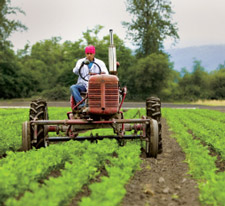Soil & Sea: reports from our producers
This article was originally published in July 2011

This month we’ll enjoy the first local, organic Lapin cherries, blueberries and leaf lettuce of the season. Local strawberries and raspberries are later than usual but arriving this month! Here’s other news from our farmers, ranchers and fishermen.
It could be a banner year for grapes, especially fruit from California’s central valley in July and August.
The Bing cherry crop had extra days to hang on the trees in June, resulting in cherries that are good-sized, full-colored, and full of sugar.
The quality of summer fruits is good or better than any year in the past, as growers have learned not to send any tiny peaches or under-ripe melons.
Almond growers are expecting a record-breaking crop this summer in California. They had braced for a smaller crop because cool, windy spring weather during bloom caused bees to stay in their hives, hindering pollination.
Sheep and lamb prices are up significantly over last year. The strong market is a combination of a declining U.S. flock, decreased imports, and a growing ethnic market.
The brown shrimp fishery in the Gulf of Mexico is off to a good start this year, as some inshore fisheries opened in late May, a few weeks earlier than normal. Shrimpers reported strong shrimp prices.
Soaring cotton prices have led many farmers in the south to plant cotton where they once grew corn, soybeans or wheat. Southern farmers planted an estimated 12.8 million acres of cotton this year — a 19 percent increase over last year.
